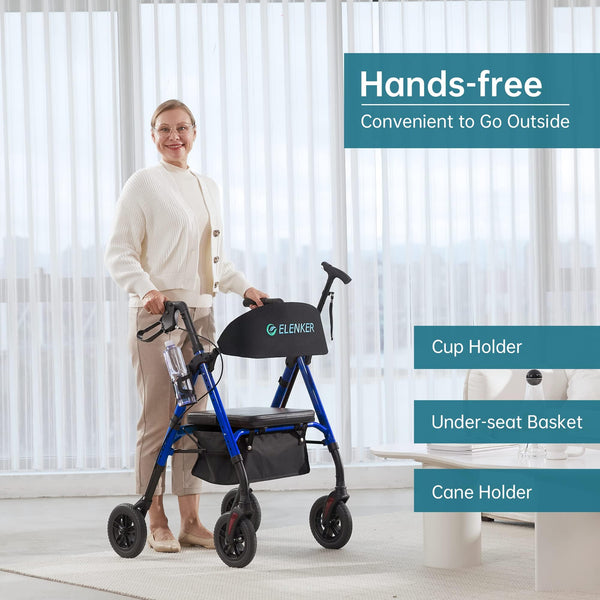Is Elenker Rollator Noisy on Hardwood Floors?
Jun 30, 2025
You’ve got shiny hardwood floors and a brand-new Elenker rollator. Everything looks great—until you take your first step and wonder: “Wait, is this thing going to drive my dog crazy? Or echo through the whole house?”
You're not the only one asking. Whether you're trying to avoid waking someone up during a nighttime stroll to the kitchen or just prefer a peaceful home, noise matters. Let’s talk about how the Elenker rollator performs on hardwood floors and what you can do if it’s louder than you expected.
It’s Not a Jackhammer… But It’s Not Silent Either
First off, most Elenker rollators aren't exactly loud—but they’re not completely silent, either. On smooth hardwood, you’ll likely hear a gentle rolling sound. Think of it like a suitcase with decent wheels rolling across an airport floor.
The noise level really depends on a few things: the kind of wheels it has, how well everything is assembled, and even what kind of hardwood floor you’ve got. Some setups are whisper-quiet. Others? A little more “clickety-clack.”
Walker Wheel Type Makes a Big Difference
Here’s where things start to matter: those wheels. Elenker usually uses wheels made of PVC or rubbery materials, which are softer than hard plastic and much kinder to your floors (and your ears).
Hard plastic wheels—like what you’d find on some cheap carts or walkers—can sound like you’re dragging a mini shopping cart across a tile floor. Not ideal. Luckily, Elenker’s wheels are designed with a bit more bounce. That helps absorb the vibrations that cause a lot of the noise on hard floors.

Elenker YF-9007A Heavy Duty Rollator Walker with PVC wheels
So no, it’s not a loud screeching sound. It’s more like a muted “whirr” or soft roll—kind of like a stroller.
Is It Your Floor or the Rollator?
Sometimes the culprit isn’t even the rollator—it’s the floor. If you’ve got older hardwood that creaks and groans just from walking across it barefoot, any mobility device is going to stir up some sound.
Uneven spots or slightly warped boards can make wheels wobble just enough to rattle a little. Add in a hollow subfloor, and suddenly everything echoes. In that case, it’s not really about the rollator being noisy—it’s about your floor amplifying it.
Loose Parts? That’s Where the Noise Starts
If your Elenker is rattling, squeaking, or just sounds off, check for loose bolts or parts that aren’t tightened all the way. A rollator that’s not fully secured can sound way louder than it needs to be.
Give the wheels a quick wiggle—do they feel secure? Are the brakes rubbing? Is anything clanking around when you move it?
A few minutes with a wrench can go a long way toward keeping things quiet. It’s kind of like fixing a shopping cart wheel—you don’t notice how bad it was until it suddenly rolls straight and silent again.
Want It Quieter? Try These Easy Fixes
If you're still hearing more noise than you'd like, there are a few little tricks you can try to quiet things down:
Clean the wheels regularly. Dust and grit can cause friction and squeaks.
Add a drop of lubricant to the wheel bearings if they feel stiff or squeaky.
Felt furniture pads under the frame (especially if you’re resting it or storing it indoors) can prevent banging when you lean it against something.
Rugs or mats in high-traffic areas can also cut down on the rolling sound—plus they’re a lot softer if you ever need a break.

Rugs or mats in high-traffic areas (KLD-9218 All Terrain Rollator Walker)
Compared to Other Rollators
If you’ve used other walkers before, especially those cheaper no-name ones or hospital-issue types, you might’ve noticed they tend to squeak and rattle more. Elenker usually does better in the noise department.
A lot of people say the Elenker’s frame feels more solid, and its wheels don’t bounce or chatter as much. That means less vibration, and less vibration means less sound on hard floors.
Still, if you’re ultra-sensitive to noise or have roommates, pets, or grandkids who nap during the day, it’s worth paying attention to the details. What’s “quiet” to one person might still be annoying to another.
Nighttime Use? Here's the Deal
If you use your rollator at night—say, for a quick trip to the bathroom—you're probably extra aware of any little sounds. Even a soft rolling noise can seem loud in a quiet house.
In that case, it might be worth adding those non-slip rubber runners in hallways or keeping a small area rug by the bed or bathroom. That way, your wheels roll across something soft and don’t tap against the wood.
Also, double-check that the brakes aren’t dragging slightly—that’s a super common source of nighttime squeaks.
How Loud Is It, Really?
On a scale from “pin-drop quiet” to “lawn mower,” an Elenker rollator on hardwood floors falls somewhere around “low-rolling suitcase.” It’s not going to wake up the neighbors, but it’s also not completely silent.
The good news? Most of that noise can be managed—either by tightening things up, cleaning the wheels, or using a few household hacks to soften the sound.
If you’ve been worried about whether the Elenker rollator will disturb your peace and quiet—don’t stress. It’s pretty gentle on hardwood. And if you ever do notice more noise than you like, there’s almost always an easy fix.
Plus, you’ll appreciate how smooth and stable it feels, even if there’s a bit of rolling noise here and there. After all, mobility and comfort come first—and a little “roll-roll” sound is a small price to pay for getting around safely.
Want to talk about the quietest model? Or need help troubleshooting a specific sound? Just ask—happy to help.











